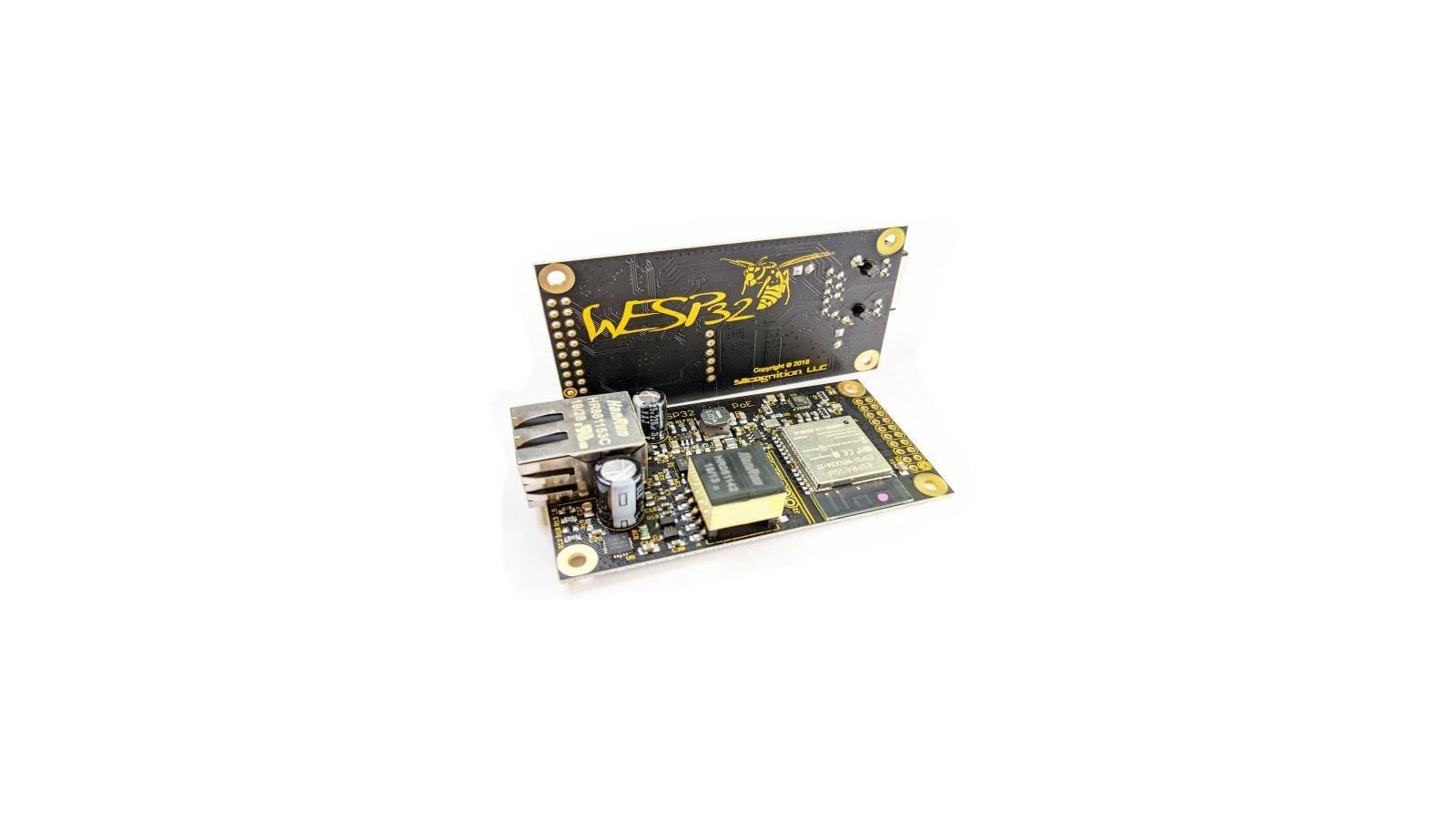The wESP32 is an ESP32-based core board with wired Ethernet connectivity and power over Ethernet (PoE). It was designed to help you quickly create zero-setup, single-wire-installation network-connected devices. By combining a powerful microcontroller with excellent community support, 13 W of available power, reliable connectivity, and a compact footprint, the wESP32 gives you a head start in your next IoT design and lets you focus on your application.
The idea for the wESP32 came from the following thought process:
So, which is more convenient? Install Wi-Fi IoT devices all over your building each of which require an electrical outlet and network setup? Or get a PoE switch and install PoE Ethernet IoT devices all over your building, each just needing a single Cat-5 cable that anyone can install?
The answer, of course, is: it depends. Many buildings already have network cables running all over the place. In that case, the answer is easy. Also, if you’re doing a new installation, there’s no question that running Cat-5 is the way to go. If you have power already available but no Ethernet cable, Wi-Fi may be the easier option.
The wESP32 helps you out in both cases: it has both Ethernet with PoE and Wi-Fi, and can be powered from PoE or external power. This allows you to create a single IoT device that provides the best of both worlds, making your customers happy no matter what their situation is. If PoE is available, they can use that. If not, they can use Wi-Fi as a backup.
The wESP32 was created to work with power sourcing equipment (PSE) compliant with the IEEE 802.3af and 802.3at PoE standards. It is not compatible with 12 V or 24 V so-called "passive PoE" systems on the market, but requires a minimum voltage of 37 V as per the IEEE specification. Category 3 or higher rated cable is required.
While cost may be somewhat higher for standards-compliant equipment, it is preferable because a lot of thought was put in to the standards by industry experts to ensure the equipment works well and is safe, not just in bench or lab settings, but also in actual production installations. Transmitting power over long runs of wire is just not compatible with low 12 V or 24 V line voltages and devices lacking isolation, and the fact that these non-compliant, hackish solutions exist unfortunately results in customer confusion.
It should be noted that since the wESP32 is powered from a third party device over a potentially long cable, across possibly a large number of connecting points, performance in reaching the specified 12.95 W of power is not solely dependent on the wESP32 itself but also on many external factors.
There are plenty of ESP32 boards on the market. Very few have Ethernet. Even fewer have PoE. I only consider the competition to be boards with both Ethernet and PoE. The only actual competitor I know of is the ESP32-POE board from Olimex.
Depending on what you need, the ESP32-POE board from Olimex may have some advantages:
On the other hand, the Olimex board has some major cons compared to the wESP32, especially for those who want a PoE board for commercial installations:
In short, the wESP32 was designed to provide a solid foundation of power, processing, and connectivity that can be used in commercial installations, and omits everything that can be considered application specific, such as the SD card and USB connector (though both can still be added if desired). The idea is for the customer to make a small add-on board that plugs into the GPIO to add what they need for their application.
Due to its lack of isolation, the Olimex board is completely unsuitable for commercial installation and belongs firmly in the realm of hobby boards. Even then, you need to be careful not to accidentally fry something when you connect to local devices by USB or other connections.
To be able to program the ESP32 on the wESP32, we created the wESP32-Prog submodule. It is a tiny module with micro USB, based on the well-supported Silicon Labs CP2102N, and includes the ESP32 auto-programming circuitry so that the circuitry doesn’t need to be duplicated on every target board and no buttons need to be pushed for programming.
The wESP32-Prog can be used both as an ESP32 programmer and as a USB serial terminal during development or in production as needed. Since the wESP32 provides full data path and power path isolation, the user can safely have the USB connected to their PC while the Ethernet cable is plugged in to the wESP32.
The wESP32-Prog was not just created as a bench tool but can be permanently installed in deployed wESP32 units by inserting it into the programming port and soldering the connections, thus becoming a permanent part of the wESP32. It may be necessary to clip the pins off after soldering if they are too long.
If the user does not need this port in deployed units, the staggered programming port footprint on the wESP32 allows the wESP32-Prog to be temporarily friction-fitted just for programming. Note that continued pressure may be necessary to ensure good contact during programming, for this reason it is recommended to permanently solder the wESP32-Prog to a wESP32 that is used for development.
There is nothing special or proprietary about the wESP32-Prog, other than that it was created specifically to be suitable for production use. So if you already own another ESP32 programmer, you can use it with the wESP32 as well. Note, however, that since there are so many variables and places where things could go wrong when using your own programmer, we only offer customer support if you are using a wESP32-Prog. If you use your own programmer, you’re assumed to know what you’re doing and you’re on your own!
"With 15 of the ESP32 GPIOs exposed, there's so much you can do with this... This looks like it'll be a pretty cool little board to work with."
Produced by Silicognition LLC in Longmont, Colorado.
Sold and shipped by Crowd Supply.

A rev 7 wESP32 (with RTL8201FI), 16 MB flash and 13 W power.

A rev 7 wESP32 (with RTL8201FI), 16 MB flash and 13 W power. The starter kit includes a serial programmer.

A programmer for the ESP32 on a wESP32. Connect the six-pin header row to a wESP32 and the USB micro Type-B port to your host machine.

A programmer for the ESP32 on a wESP32. Connect the six-pin header row to a wESP32 and the USB Type-C port to your host machine. Supports USB-PD to deliver up to 13 W at 12 V via USB to the wESP32 - a suitable replacement for PoE.

Silicognition LLC is an electronic design services company that focuses on deeply embedded, IoT and low power systems.